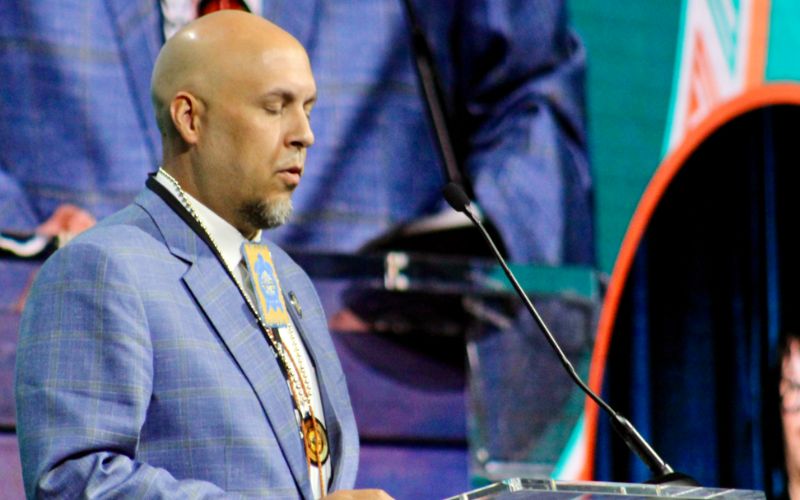
- Details
- By John Lowery
Guest Opinion. There are currently two proposals to amend the constitution of the National Congress of American Indians (NCAI) which would remove state-recognized tribes from membership. NCAI, which was established in 1944 to bring UNITY to the many tribal nations, is at a crossroads. These proposals would remove some long-time members from being eligible to vote or participate at NCAI in the future.
These amendments will create an internal termination process that contradicts the founding principles of NCAI. During my speech to the general assembly I stressed how these amendments are the beginning of a slippy slope for NCAI. If state tribes are removed, who will be the next set of tribes to be targeted for removal? How about non-treaty tribes or tribes that cannot take land into trust? Will the next amendment seek to remove tribes who have recognition based on congressional legislation instead of the BIA acknowledgement process? Will NCAI vote to remove tribes that have no land base? Will non-casino tribes be removed from NCAI? When will NCAI finish removing all the imperfect tribes in order to appease the tribes who are perfect and have it all?
Unfortunately, some tribal leaders seem to have forgotten the struggles of their ancestors prior to any type of “federal recognition.” It is clear that some believe if you do not have a treaty with the United States government then your tribe is on a lower level. Indian Country should never be in a position where individual tribal leaders or tribal nations are looking down on their brothers and sisters. Each tribe has their own history, their own unique stories, but we must continue to walk the same path and promote and support one another. As the Indigenous peoples of these lands, we are the minority of the minority and we must never forget that. We are still listed as “other” in many surveys and categories. We still struggle to be seen and recognized by mainstream society and yet we stand here at NCAI and fight among ourselves. We are debating rather or not to create an internal termination policy. These are serious times for NCAI and we must see clearly with our hearts and minds.
The handful of state recognized tribes who are members of NCAI are not the enemy of federally recognized tribes. State recognized tribes show up at NCAI, pay dues, and contribute to the meaningful dialogue. We are not takers, we are givers. We have a long history of supporting Indian Country and that will not change. Many federally recognized tribes today were once state recognized tribes that had to go through the long strenuous BIA acknowledgement process or wait on Congress to pass their recognition act. It is my hope that these once state tribes remember where they came from and will oppose these amendments.
My tribe, the Lumbee Tribe, was recognized by congress in 1956 and at the same time denied services as our legislation passed during the “Era of Indian Termination.” Because of the language in the Lumbee Act of 1956 the BIA has said we are not allowed to be on the federal recognition list that is produced by the Department of the Interior once a year. So, the Lumbee, along with our brother and sister state tribes, are facing removal, we are facing termination, and it is at the hands of our own Indigenous relatives. We need to stand for UNITY and stand against division and vote no on these proposed amendments.
John Lowery is chairman of the Lumbee Tribe of North Carolina
Help us defend tribal sovereignty.
At Native News Online, our mission is rooted in telling the stories that strengthen sovereignty and uplift Indigenous voices — not just at year’s end, but every single day.
Because of your generosity last year, we were able to keep our reporters on the ground in tribal communities, at national gatherings and in the halls of Congress — covering the issues that matter most to Indian Country: sovereignty, culture, education, health and economic opportunity.
That support sustained us through a tough year in 2025. Now, as we look to the year ahead, we need your help right now to ensure warrior journalism remains strong — reporting that defends tribal sovereignty, amplifies Native truth, and holds power accountable.
 The stakes couldn't be higher. Your support keeps Native voices heard, Native stories told and Native sovereignty defended.
The stakes couldn't be higher. Your support keeps Native voices heard, Native stories told and Native sovereignty defended.
Stand with Warrior Journalism today.
Levi Rickert (Potawatomi), Editor & Publisher

